Blown away by those viral ChatGPT conversations? Amazed by how realistic AI-generated art looks? While generative AI like ChatGPT captures headlines, do you know the tangible benefits this technology can bring?
Recent surveys by Deloitte show that 63% of IT leaders plan to adopt generative AI models within two years. Why the surge in interest?
Generative AI can automate content creation, accelerate drug discovery, improve supply chain efficiencies, and more according to McKinsey. But hype aside, how can you leverage it? With capabilities generating text, code, images, videos, and even 3D models, the possibilities are endless.
From creating viral marketing campaigns to optimizing your website for SEO, generative AI unlocks new superpowers. However responsible implementation requires planning. Let's explore mind-blowing ways generative AI models can transform your business or organization while navigating risks. The revolution is here - will you lead it?
What is Generative AI?
Artificial Intelligence (AI) has made tremendous strides in recent years, and one fascinating area of AI is Generative AI.
In this section, we'll explore the definition and concept, compare it with traditional AI, and delve into some intriguing examples of its applications.
Examples of Generative AI Applications
Generative AI models have found their way into numerous domains, enriching industries and sparking creativity. Some notable examples include:
Art and Design: Generative AI apps can create unique artwork, designs, and graphics, pushing the boundaries of the human imagination.
Music and Composition: Generative AI models can compose original music pieces in various genres, expanding the realm of musical creation.
Virtual Reality (VR) and Gaming: Generative AI models powers the creation of immersive virtual worlds, interactive game environments, and lifelike characters.
Make best out of Generative AI by using it in chatbots for various use-cases such as:
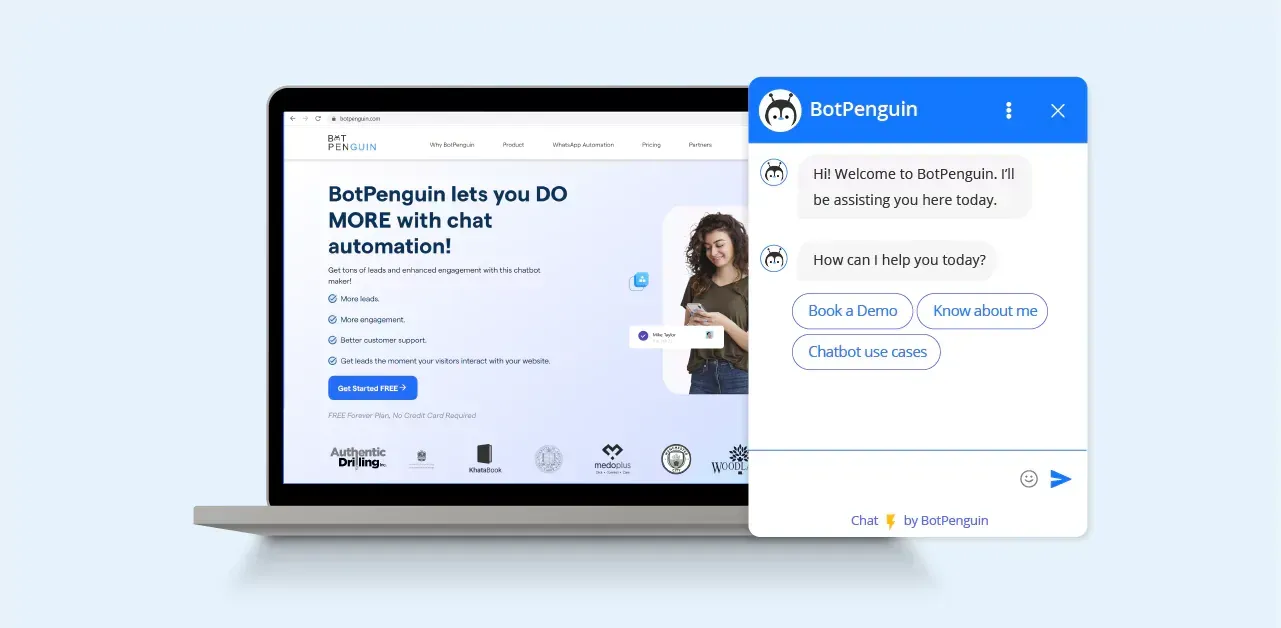
Why is Generative AI the Future of Innovation?
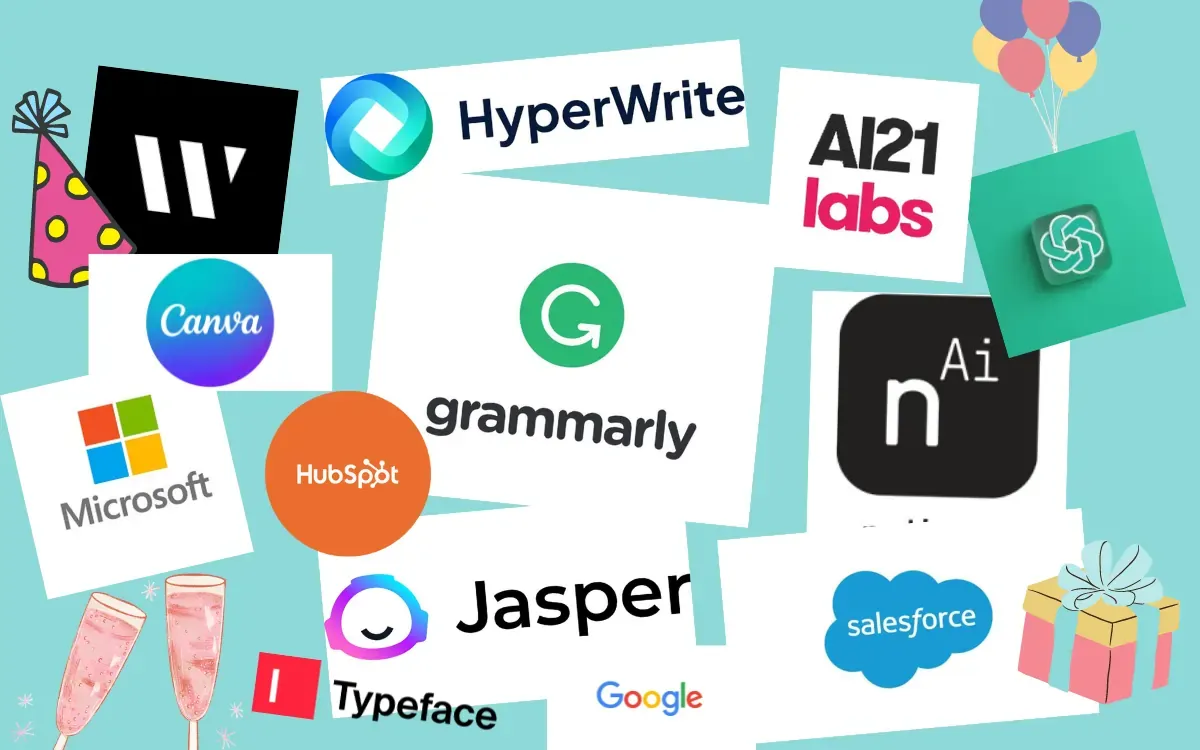
Generative AI apps have the potential to revolutionize industries, empower individuals, and unlock new possibilities. Let's explore some of the key reasons why Generative AI is considered the future of innovation.
Enhancing Creativity and Unlocking New Possibilities
Generative AI apps enable humans to tap into a virtually limitless well of creative potential. Providing new and unexpected ideas enhances the creative process and offers novel perspectives, leading to breakthroughs in various domains such as art, design, and storytelling.
Revolutionizing Industries through Automation and Efficiency
Generative AI benefits include automating complex tasks, leading to increased efficiency and productivity across industries.
For instance, in fields like manufacturing and architecture, Generative AI benefits include optimizing designs, generating prototypes, and streamlining production processes, resulting in cost savings and faster development cycles.
Enabling Personalized Experiences and Customization
Generative AI apps empower businesses to deliver personalized experiences to their customers.
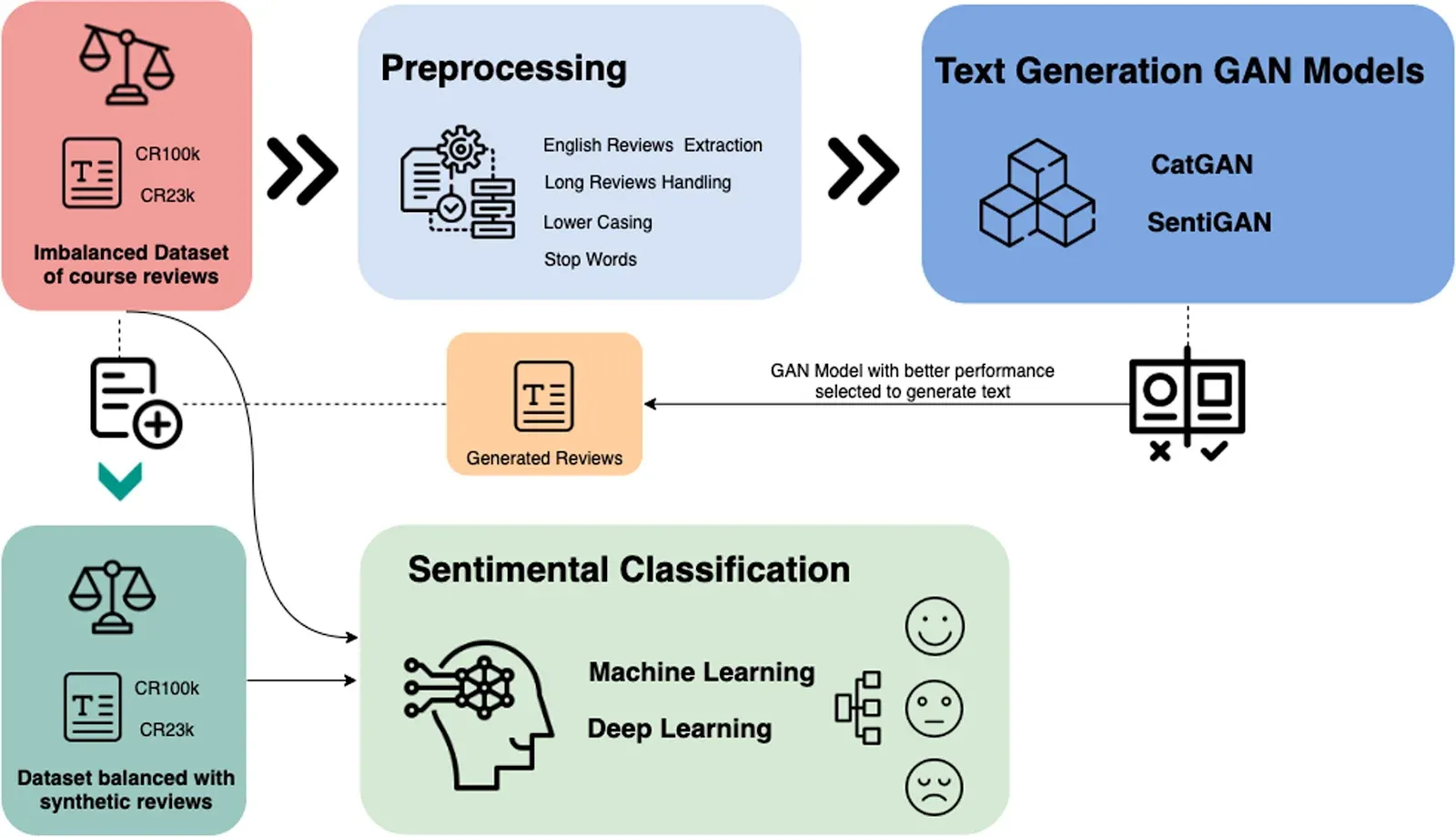
By leveraging customer data, its algorithms can generate tailored recommendations, customized products, and personalized user interfaces, enhancing customer satisfaction and loyalty.
Who Benefits from Generative AI?
It has wide-ranging benefits, impacting various stakeholders, including industries, businesses, entrepreneurs, and society as a whole. Let's explore Generative AI benefits.
Industries and Sectors Leveraging Generative AI
Numerous industries can leverage Generative AI to drive innovation and efficiency. Some key sectors include art and design, entertainment, fashion, healthcare, architecture, and advertising.
Generative AI opens up new possibilities for these industries, fostering creativity and transforming the way they operate.
Impact on Businesses, Startups, and Entrepreneurs
It offers businesses a competitive edge by enabling them to create unique products, enhance customer experiences, and automate various processes.
Startups and entrepreneurs can leverage Generative AI apps to develop disruptive solutions, enter new markets, and revolutionize industries.
Potential Benefits for Individuals and Society as a Whole
It has the potential to benefit individuals and society in numerous ways. It can assist in generating personalized healthcare treatments, aid in the development of sustainable solutions, and contribute to advancements in education and research.
Moreover, Generative AI democratizes creativity by allowing individuals to explore their artistic capabilities and express themselves.
Suggested Reading:
7 Benefits of Generative AI
The applications go far beyond viral TikTok filters and AI art. When leveraged responsibly, generative AI delivers immense value. Let's explore 7 mind-blowing ways it can benefit organizations.
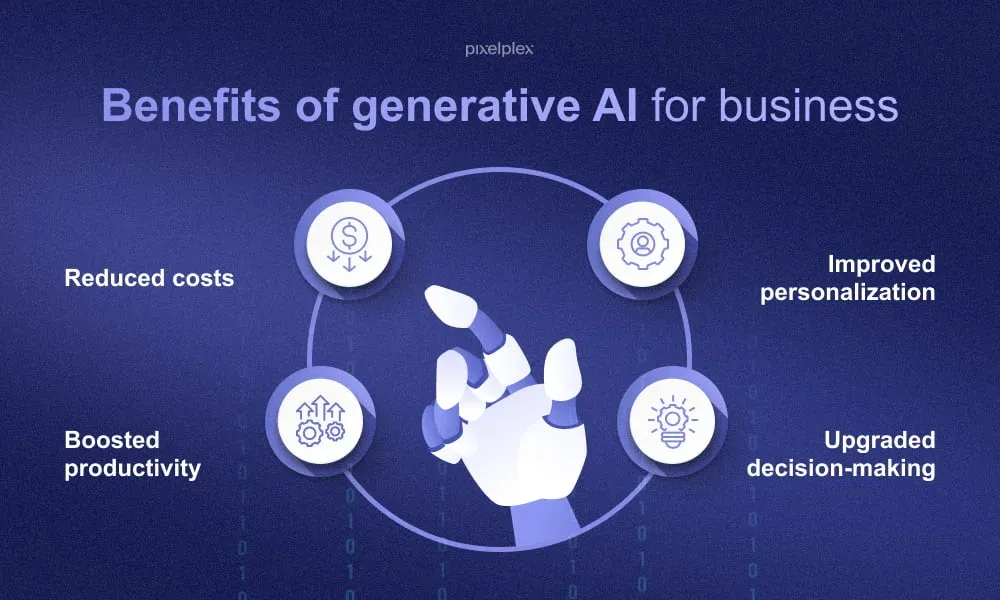
1. Automated Content Creation
For marketers and publishers, generative AI eliminates writer's block. Tools like Jasper and Quill can generate blog posts, social media captions, and marketing copy in seconds.
This content matches human quality but in a fraction of the time according to testing by Anthropic.
Even emails and reports can be created through AI. Generative AI models enables enterprises to scale content production exponentially.
2. Accelerated Drug Discovery
Finding new life-saving drugs is extremely lengthy and expensive. But Generative AI models like DeepMind's AlphaFold have accelerated protein analysis from years to days.
Per Deloitte, generative AI could expedite drug discovery by up to 70%.
It rapidly predicts drug-protein interactions, minimizing trial and error. This acceleration helps bring drugs to market faster.
3. Supply Chain Optimization
Generative AI benefits include supply chain planning and forecasting.
Tools like Intellegens' AI can analyze billions of data points to identify risks, predict disruptions, and simulate interventions.
McKinsey estimates AI can reduce supply chain costs by up to 7%. This optimization allows dynamically adapting logistics amid volatility.
4. Personalized Recommendations
Online platforms leverage generative AI to understand customer preferences and curate hyper-personalized product recommendations.
This tailored content keeps customers engaged. According to McKinsey, personalized recommendations can boost sales by 10-30%.
Generative AI benefits also include creates customized advertising.
5. Chatbot Conversations
Intelligent chatbots like Anthropic's Claude use generative AI to handle customer service inquiries through natural, empathetic conversations.
With 24/7 availability, chatbots satisfy customers and lower costs.
Gartner predicts $500 billion+ in annual cost savings from AI customer service agents by 2030.
6. Code Generation and Completion
For software engineers, generative AI speeds up development by automatically generating and completing code.
GitHub Copilot and Tabnine suggest entire function blocks rather than just line completions.
Developers report generative coding AI saves them time and speeds up debugging.
7. Creative Content Generation
From music to 3D models, generative AI creates original digital art and media.
DALL-E 2 by OpenAI can generate images from any text prompt. Tools like Jukebox produce music in any genre or style.
This democratizes creativity, allowing anyone to instantly manifest their ideas.
From content creation to drug discovery, generative AI apps brings game-changing capabilities. Adopting it strategically creates new opportunities and efficiencies.
However, managing risks remains critical for responsible implementation. With prudent governance, enterprises can amplify human creativity and aptitude using generative AI's virtual imagination.
The future looks bright with this technology as our partner.
Suggested Reading:
Where is Generative AI Being Implemented?
It is already making significant strides in various industries and domains. Let's explore some examples of where Generative AI is being implemented and the potential areas of growth in the future.
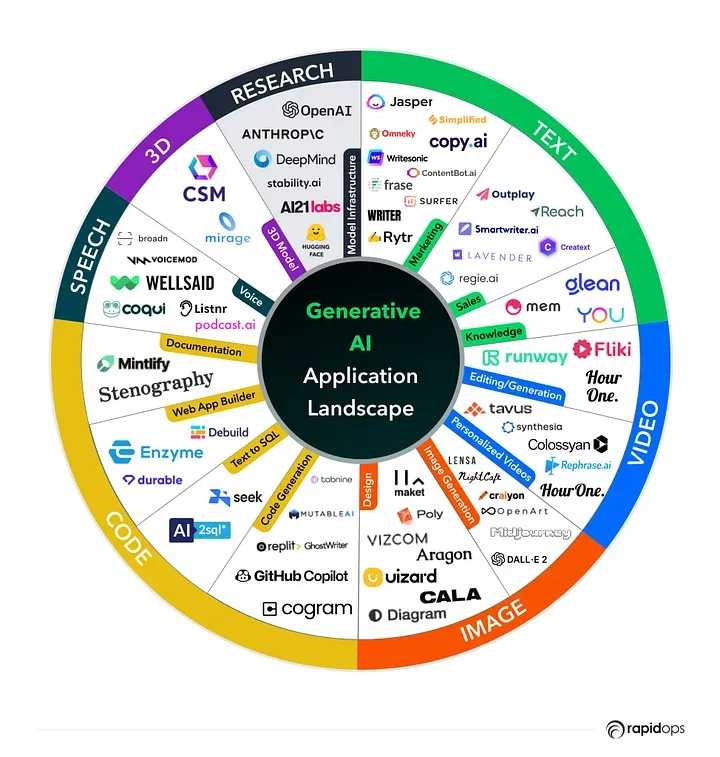
Industries and Domains Adopting Generative AI
It is being adopted in industries such as advertising, entertainment, healthcare, architecture, and e-commerce.
These sectors benefit from its unique capabilities to create visually stunning advertisements, generate realistic virtual characters, optimize healthcare treatments, design sustainable buildings, and personalize shopping experiences.
Real-World Examples of Generative AI Applications
DeepArt: DeepArt utilizes algorithms to transform ordinary photographs into stunning works of art, mimicking the styles of famous artists.
Magenta Project: Magenta, a Google Brain project, explores Generative AI in music composition, creating harmonious and original musical pieces.
Archillect: Archillect is an AI-driven platform that curates and generates visually captivating content, continuously discovering and sharing unique images.
Future Possibilities and Potential Areas of Growth
The potential applications of Generative AI are vast and expanding. As technology advances, we can expect Generative AI to find its way into more fields, such as virtual reality, robotics, content creation, and scientific research.
The possibilities for innovation and creative expression through Generative AI are truly exciting.
What are the Potential Risks and Limitations of Generative AI?
While it holds immense potential, it's important to acknowledge and mitigate the associated risks and limitations.
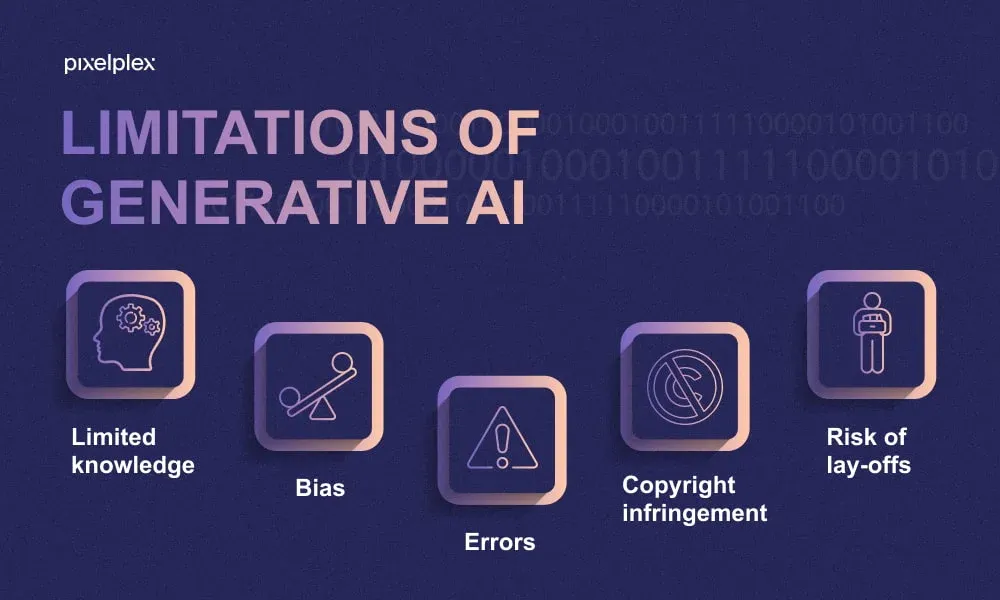
In this section, we'll explore the concerns surrounding privacy, security, potential misuse, and the promotion of responsible use.
Privacy and Security Concerns
The systems can generate highly realistic content, raising concerns about privacy and security. Deepfakes and other AI-generated content pose risks, including identity theft, fraud, and misinformation.
Safeguarding data and implementing robust security measures are essential to protect against these threats.
Potential Misuse and Unethical Applications
As with any technology, it can be misused for harmful purposes.
It's crucial to address potential risks, such as the creation of malicious content, infringement of intellectual property rights, and the amplification of propaganda.
Ensuring ethical guidelines and responsible use of Generative AI is imperative.
Addressing the Risks and Promoting Responsible Use
To mitigate the risks associated with it, a collective effort is required. This involves establishing legal frameworks, fostering collaboration between researchers and policymakers, and promoting transparency and accountability in AI development.
Responsible use of Generative AI will help unlock its transformative potential.
How to Stay Ahead in the Generative AI Revolution?
To leverage the full potential of Generative AI, it's essential to stay informed, embrace collaboration, and foster a growth mindset.
In this section, we'll explore strategies for staying ahead in the Generative AI revolution.
Continual Learning and Keeping Up with Advancements
It is a rapidly evolving field, with new techniques and models being developed regularly. To stay ahead, continuous learning is crucial.
Engaging in ongoing research, attending conferences and workshops, and exploring online resources will help you stay at the forefront of Generative AI.
Collaboration and Knowledge-Sharing in the AI Community
The AI community thrives on collaboration and knowledge-sharing.
Engaging with fellow practitioners, participating in forums, and joining AI communities will broaden your perspectives, expose you to diverse ideas, and foster innovation through collective intelligence.
Embracing a Growth Mindset and Adaptability
As technology advances, it's important to embrace a growth mindset and be adaptable.
It will continue to evolve, and being open to new possibilities, learning from failures, and embracing innovation will position you for success in this transformative field.
Conclusion
In summary, the stunning benefits of Generative AI are turning heads and shaping the future.
Through their monumental potential in dynamically creating content, revolutionizing design, personalizing experiences, enhancing data privacy, and fostering innovation across diverse industries–among many other things—these AI models are a game-changer.
As we delve into the vast applications and possibilities of this technology, it becomes crystal clear that we've just scratched the surface of what Generative AI can truly offer.
So, let's gear up and embrace this fantastic tech, as it continues to explore unchartered terrain and redefine digital creativity.
Frequently Asked Questions (FAQs)
What are the practical applications of generative AI?
Generative AI has practical applications in various fields, including art, content creation, design, virtual reality, healthcare, and even gaming. It can be used to generate realistic images, design patterns, music compositions, and more.
How can generative AI enhance creativity and innovation?
Generative AI can expand creative possibilities by offering new and unique ideas, designs, and combinations.
It can inspire artists, designers, and innovators by providing novel starting points for further exploration and refinement.
Can generative AI be used for personalized content generation?
Yes, generative AI can create personalized content based on individual preferences and data.
It can generate personalized recommendations, tailored advertisements, customized design options, and personalized product offerings.
What are the advantages of using generative AI in healthcare?
Generative AI can aid in medical image analysis, drug discovery, and disease prediction.
It can generate synthetic medical images, simulate biological systems, and help researchers identify new treatment possibilities.
Is generative AI a threat to jobs and human creativity?
While generative AI can automate certain creative tasks, it also provides opportunities for humans to leverage the technology and collaborate with it. It can augment human creativity and lead to new job roles and possibilities.
What are the ethical considerations of generative AI?
Ethical considerations include issues like copyright infringement, false information generation, biased outputs, and misuse of the technology.
Proper guidelines and ethical frameworks need to be in place to ensure the responsible use of generative AI.
How can generative AI contribute to sustainable design and manufacturing?
Generative AI can optimize design and manufacturing processes, reducing waste, improving energy efficiency, and creating sustainable products.
It can generate design alternatives that meet specific requirements while minimizing environmental impact.


